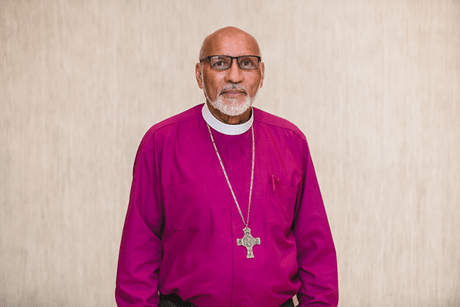Head of the Anglican Church in Jamaica and the West Indies, Dr Howard Gregory, has called for the Government to make the Caribbean Court of Justice (CCJ) Jamaica’s final Appellate Court.
“We must also support and advocate for the Caribbean Court of Justice becoming the final appellate court for this nation and the region and stop claiming that we cannot trust our Caribbean jurists to act with integrity,” declared Gregory.
He was delivering Tuesday’s sermon at a service to open the 153rd Synod, the annual meeting of senior officials of the Anglican Church.
The Synod was attended by Bishop Conrad Pitkin, Custos of St James, who represented Governor General Sir Patrick Allen; Councillor Richard Vernon, Mayor of Montego Bay; and Lieutenant Colonel Reverend Hartley Perrin, Custos of Westmoreland. Other key dignitaries included Zhailia McCalla, chancellor of the Anglican Diocese of Jamaica and The Cayman Islands.
Jamaica is at a crossroads on whether to make the decision to have the CCJ as her final appellate court instead of the London-based Privy Council in the United Kingdom (UK).
JLP policy
The Andrew Holness-led Jamaica Labour Party (JLP) administration has long raised objections to the CCJ becoming Jamaica’s final Court of Appeal.
While serving as opposition leader, Holness, in 2012, while appointing senators, required that they all sign undated letters of resignation and a letter authorising Holness to date and submit the letters to the governor general as if to threaten them against siding with a Portia Simpson Miller-led People’s National Party (PNP) administration to make the CCJ Jamaica’s final court and to depart from the JLP policy on that court.
The JLP has long favoured a national referendum being used to determine whether Jamaica should accede to the appellate division of the CCJ replacing the UK’s Judicial Committee of the Privy Council (JCPC) as Jamaica’s final appellate court. At the time, the PNP preferred having the change enacted by a vote in both chambers of Parliament, requiring a two-thirds majority to amend the Jamaican Constitution.
At present, the JLP has a majority in the House of Representatives following the 2020 General Elections, where they won 49-14 seats.
But Gregory questioned the integrity of the continuous delay in making the CCJ Jamaica’s final court to which litigants can take their cases to be heard after they are completed in the country’s justice system.
“And so I pose the question, if we cannot trust our jurists, on what basis should we trust any other institution of governance within our nation and the region to defend justice and act with integrity?rdquo; the archbishop of the Anglican Church in the province of the West Indies queried.
Constitutional reforms
Gregory also called for a greater push towards constitutional reforms to advance the transformation of Jamaica from the shackles of colonialism into an independent Republican state.
“Additionally, we must support and advocate for the setting up of the announced process of constitutional reform to enable the country to achieve Republican status within the Commonwealth,” he charged.
Located in Port-of-Spain, Trinidad and Tobago, the CCJ settles disputes between Caribbean Community (CARICOM) member states, and while Jamaica and 14 other CARICOM states are members of the CCJ, the United Kingdom’s Judicial Committee of the Privy Council remains its last resort in civil and criminal matters.
However, the CCJ serves as the highest court of appeal on civil and criminal matters for four CARICOM member states, namely Barbados, Belize, Dominica, and Guyana.
The CCJ does not have competence to hear individual complaints of alleged human-rights violations except in its capacity as a court of final appeal in civil and criminal matters, which often involve fundamental rights.
Last September at its national conference, Opposition Leader Mark Golding declared that his party was not interested in Jamaica becoming a republican state while maintaining the Privy Council as its final court.
“We in the PNP have no interest in moving to a republic while retaining the King’s Privy Council in London as Jamaica’s final court. Time come for full decolonisation,” Golding told his party supporters eight months ago.
He argued that Jamaica needs a final court where they don’t need a visa to go there and where the costs are not way out of their reach.
“Time come for a Jamaican head of state and the Caribbean Court of Justice as our final court. We will support both moving forward together. We have no interest in one without the other,” he insisted.















